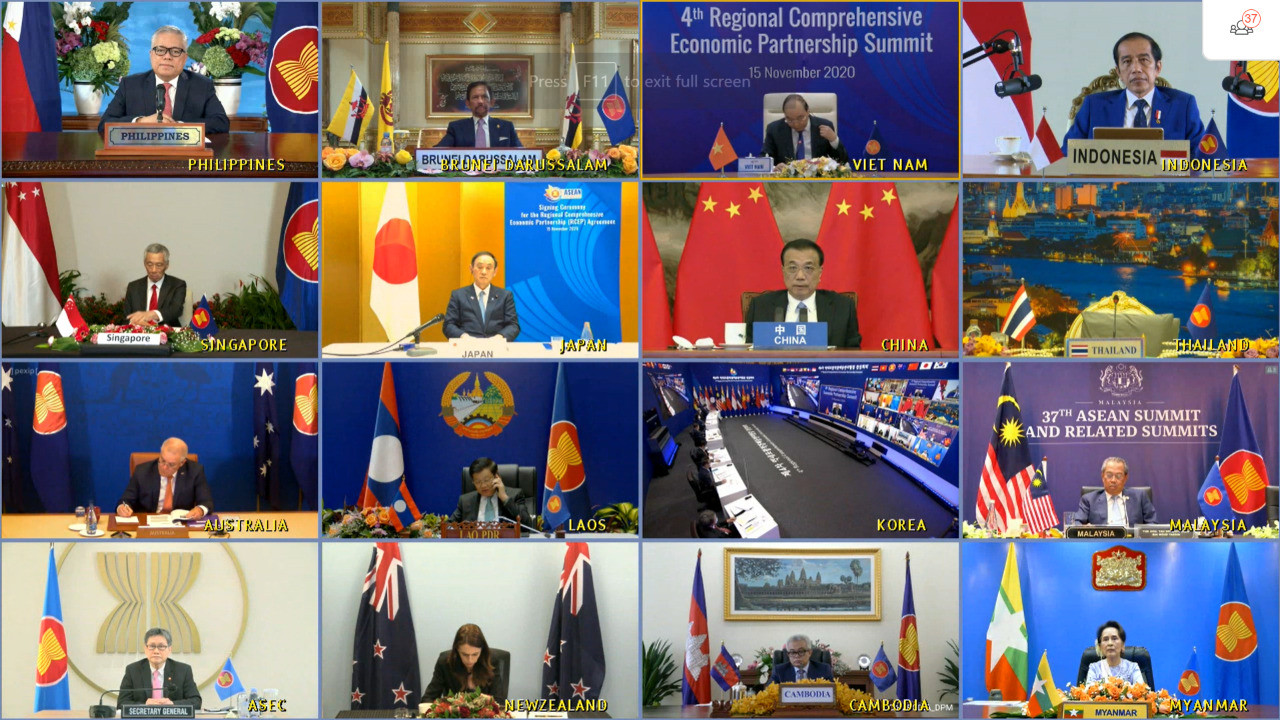Popular Reads
Top Results
Can't find what you're looking for?
View all search resultsPopular Reads
Top Results
Can't find what you're looking for?
View all search resultsRI to leave out ‘sensitive’ goods from RCEP tariffs
The three commodities are among the 9 percent of tariff lines Indonesia is leaving out of its commitment under the recently signed multi-country trade pact.
Change text size
Gift Premium Articles
to Anyone
I
ndonesia plans to exclude the “sensitive” commodities of rice, weaponry and alcoholic beverages from its scheduled commitment to eliminating tariffs in the Regional Comprehensive Economic Partnership (RCEP).
“These are the sectors that we always consider to be very, very sensitive for Indonesia,” Iman Pambagyo, the Trade Ministry director general for international trade cooperation, said in a virtual discussion. “We never include them in our commitment under any agreement.”
Earlier this month, Indonesia joined the nine other members of the Association of Southeast Asian Nations (ASEAN) along with Australia, China, Japan, South Korea and New Zealand in signing the RCEP. The participating countries of the landmark deal represent nearly one-third of the global economy.
Quoting data from Statistics Indonesia (BPS), the Trade Ministry said that the RCEP countries accounted for 61.6 percent of Indonesian exports and 71.3 percent of its imports last year.
Read also: Indonesia banks on RCEP for reduced uncertainty in trade
Trade Minister Agus Suparmanto said earlier on Nov. 15 that the RCEP was deemed necessary amid the challenges to global trade from the US-China trade war, waning confidence in the World Trade Organization (WTO), increased competition in new markets and growing protectionism.
Indonesia has committed to eliminating 91 percent of its tariff lines in the coming years under the world’s largest free trade agreement (FTA), with rice, weapons and alcoholic beverages among the 9 percent of tariff lines excluded from the deal.
In comparison, Indonesia has eliminated 93 percent of its tariff lines under the AANZFTA between ASEAN states, Australia and New Zealand, while it has eliminated 92 percent of its tariff lines under the ACFTA pact between ASEAN and China.
The government’s decision to exclude rice from its tariff commitment was intended to protect around 14 million rice farmers, the single largest group of smallholder farmers in the agricultural sector, said agriculture professor Dwi Andreas Sentosa from IPB University. He added that many rice farmers were smallholders who owned 0.2 to 0.3 hectares (ha) of land, far below the national average of 0.7 ha.
“If we open [free trade for rice], it will harm our farmers, as we know that the price disparity between the price at home and at the international level is relatively high,” Dwi told The Jakarta Post by phone on Wednesday.
According to data from the Center for Information on Strategic Food Prices (PIHPS) the average price of rice in Indonesia was Rp 11,800 (84 US cents) per kilogram in October, whereas the World Bank’s “Pink Sheet” on commodity prices showed that the price of Thai and Vietnamese rice was nearly half that figure.
While two out of three smallholder farmers were net consumers, Dwi said, eliminating import tariffs on rice might have the unintended consequence of forcing Indonesian rice farmers out of business.
The Agriculture Ministry has estimated this year’s rice surplus to reach between 6 million and 7 million tons. Combined with the remaining supply, it expects the projected yield for the current harvest season from October 2020 through March 2021 to meet the estimated consumption of 15 million tons in the first half of 2021.
Read also: RCEP poses challenges to IT, labor-intensive industries
Meanwhile, alcohol is still a sensitive issue in Indonesia, home to the world’s largest Muslim population. Recently, several House of Representatives factions sought to resurrect a long-stalled alcohol prohibition bill that would ban the production, distribution, storage and consumption of alcohol.
“Regarding international trade, from what we know, Indonesia does not consider the alcoholic beverage industry a priority, perhaps because of its sensitive nature [for Muslims],” Association of Distributors and Importers of Imported Beverages (Apidmi) secretary-general Ipung Nimpuno told The Jakarta Post in a phone interview on Thursday.
However, while RCEP countries are not the main source of alcoholic beverages for Indonesia, committing to eliminating the tariff for alcoholic beverages, which also means lower prices, may benefit the government, businesses and consumers as importers currently face a tariff of 150 percent, Ipung said.
With wine accounting for the largest share of alcoholic beverage imports, European countries like the United Kingdom are Indonesia’s main source of imported alcoholic beverages, the association noted. Although South Korean soju has gained popularity, especially among Indonesian millennials, some businesses have started producing the drink at home.
“But if we want all parties to benefit, both the government in terms of revenue and alcoholic beverage players, we need to adjust the tariffs to prevent the emergence bootleggers,” Ipung said.
Aside from liberalizing trade in goods, Indonesia had also committed to opening trade in 104 service subsectors, said the Trade Ministry’s Iman.
ASEAN states have committed to liberalizing an average of 100 to 115 service subsectors and the five other partners between 100 and 138 service subsectors under the RCEP, which covers financial, telecommunications and professional services. Chapter 8 of the agreement outlines provisions on the removal of restrictive and discriminatory measures, including rules on market access.
Analyst Ira Aprilianti at MicroSave Consulting, which focuses on financial, social and economic inclusion, said on Tuesday that the RCEP was expected to grow Indonesian exports by eliminating tariffs, as well as untangle the “spaghetti bowl effect”.
In a nutshell, the term refers to the proliferation of FTAs that eventually leads to trade disadvantages for the participating countries.
“ASEAN previously had separate FTAs with China, Japan, Australia, New Zealand and South Korea. [...] many economists say this could lead to a spaghetti bowl effect, namely an [obstacle] to trade because of the differing rules [of the agreements],” she said.
Editor’s note: The article has been updated to contain the comment from Apidmi.










